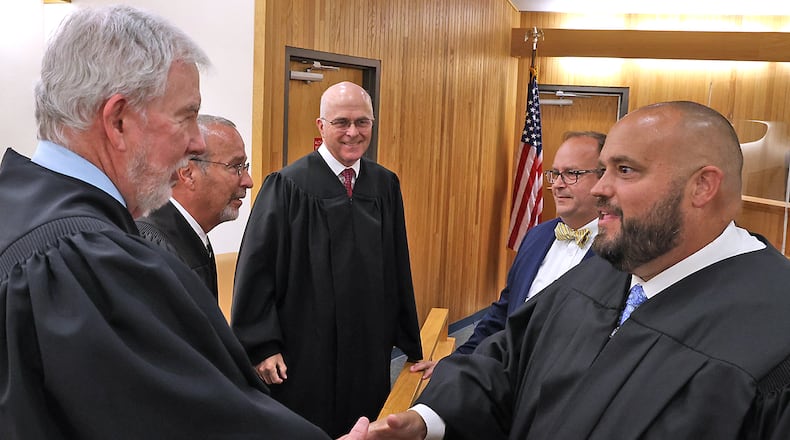“There are procedures in place for any perceived conflicts that may exist, whether that be between myself and the prosecutor or other litigants in the matter,” Driscoll said.
He is running against two others – Bob Lancaster and Regina Richards – for the seat to being vacated by Judge Richard O’Neill, whose term is set to expire in January next year.
Thomas Hagel, a University of Dayton law professor emeritus, said nothing in Ohio law prohibits a person from taking on a judicial role while having a sibling working as an elected leader in the criminal justice system or beyond. Certain procedures are in place for legal professionals to avoid “the appearance of impropriety,” too, he said.
The Ohio Code of Judicial Conduct outlines procedures surrounding relationships that may cause people to question the fairness of proceedings. The code requires notice to all parties of any potential conflict through a waiver system.
“As long as the defense attorney has no problem with it, the defendant has no problem with it, and everybody is upfront in terms of the relationship, then there shouldn’t be any problem,” Hagel said.
One step that could be taken is having cases appearing in the county’s Common Pleas court shifted to allow one judge more criminal cases and the other more civil, Brian Driscoll said.
“We will make the docket so that everyone is getting their day in court within the timelines that are prescribed by the Constitution,” Brian Driscoll said.
Clark County outpaces state averages for overall cases – civil and criminal, said Clark County Common Pleas Domestic Relations Judge Thomas Capper.
The Ohio Supreme Court tracks the average number of civil and criminal cases judges in the state see annually.
In 2021, the average Ohio Common Pleas Court judge had 324 criminal cases on his or her docket. Last year, O’Neill had 669 criminal cases on his. The judge had fewer civil cases last year than the state’s average, however: 193 compared to 359, according to Capper.
In the event no active judge in a court can take a case due to conflicts of interest, a visiting judge can be appointed to the case by the Ohio Supreme Court, an expense covered by county funds, Hagel said.
Capper said visiting judges are paid the same rate as active judges – who earn a salary of roughly $155,000 in the Clark County Common Pleas Court – and also earn a healthcare stipend. Those working an eight-hour day earn roughly $621, which includes the stipend and hourly wages.
Capper is the presiding judge, meaning he files applications to the Ohio Supreme Court every time a Clark County Common Pleas Court judge requires a visiting judge due to a conflict of interest.
When conflicts arise, a judge files a motion to pass the case along and send the case information to the administrative judge. Capper said in his case, he often is able to assign cases to the other judge in Common Pleas, and the use of visiting judges is infrequent.
In 2022 so far, only five visiting judges have been used for the Clark County Common Pleas Court, according to Capper.
Visiting judges appointed to a county court by the Ohio Supreme Court are often retired judges. In Ohio, the mandatory retirement age is 70 for those in judicial seats, Capper said.
This sometimes can make finding visiting judges challenging for the state’s supreme court: older, retired judges may not want to drive across the state to preside over one case, and they often don’t want to accept cases that deal with violent crime.
“They’re in the twilight of their careers, right?” Capper said. “They want to relax and don’t necessarily want to come into a different county and take a nasty case.”
Visiting judges appointed to Clark County cases often hail from the Dayton or Columbus areas or within the county itself for this reason, Capper said.
Brian Driscoll has worked as a judge in Clark County before. In June of 2021, he was appointed to a Clark County Municipal Court seat by Gov. Mike DeWine to replace longtime Clark County Municipal Court Judge Denise Moody, who retired that spring.
About the Author

